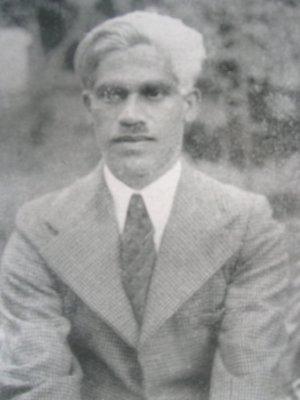A. K. Pillai
In 1920 when the Non-cooperation Movement had just started, Mr. A. K. Pillai was a young student from the Oxford University. Already graduated from the Madras University, he was doing his "Law Schools" at Oxford, and keeping terms at the Inner Temple, London.
In England he took keen interest in Indian affairs, speaking at public meetings and writing in the British Press. He was a very popular figure at the Indian Majlis at Oxford, which he represented at the inter varsity debates on more than one occasion. At the instance of Mahatma Gandhi he left his studies in England in 1921 and returned to India to take up Congress work.
K.L. Kamat/Kamat's Potpourri
A. K. Pillai
For full eight years he devoted himself wholly to the service of the Congress in various capacities, applying in that behalf not only his talent and training but also a decent patrimony which he had.
Soon after his return he was put in charge of organizing the new Congress Province of Kerala comprising of Malabar, Travancore and Cochin. He himself hails form Travancore which was mainly the scene of the activities. To facilitate organizational and propaganda work, he started a vernacular paper, the "Swarat", which was the first nationalist journal in the West Coast. In a couple of years, there were functioning over sixty Congress Committees in Travancore alone. Travancore was soon found equal to one of the grimmest struggles of recent Indian history, namely, the Vykom Satyagraha. Mr. Pillai and other leaders of the fight were imprisoned at the very commencement of the struggle. But the cause had become so popular that the fight went on vigorously and was won.
This was the first great battle in a long campaign against untouchability and civil disabilities arising there from. Mr. Pillai, for his part, continued it into the state Legislature of which he was foe several years an elected member. The recent Proclamation of Travancore relating to temples, roads and other public institutions marked the happy consummation of that campaign on the southern sector. The mass awakening among the so called "Depressed Classes" has been phenomenal. In the wake of this campaign came a series of political and economic demands form these essentially laboring classes. The demands are gaining increasing momentum.
He was one of the promoters of the London Branch of the Indian National Congress, and represented that body at the Cologne session of the League Against Imperialism. He also participated in other international Conferences of Colonial peoples and oppressed nationalities. His thesis on the class character of the legal system prevailing in India was adopted by the Council of the Judicial Conference held at Berlin. He had been by now called to the bar by the Inner Temple and was enrolled as a Barrister before the King's Bench in London.
Source: Haripura Congress Souvenir, 1938
Appendix
Additional Information from The Honourable Society of the Inner Temple on August 25, 2020
A.K. Pillai was originally admitted to the Inner Temple 14 Nov. 1919, but does not appear to have gone on to sit the Bar Examination at that time. He was re-admitted (18 June 1928) and The Times records that he passed the Bar Examination in Roman Law, Hilary Term 1929, and in Roman-Dutch Law, Trinity Term 1929. I would guess that he was exempted from the other papers by virtue of being already a law graduate. The Bar Examination (set by the Council of Legal Education, not the Inner Temple itself, which had no examining responsibilities) would not in any case have involved the submission of a thesis. Pillai was called to the Bar 2nd of July 1930.
![]()

